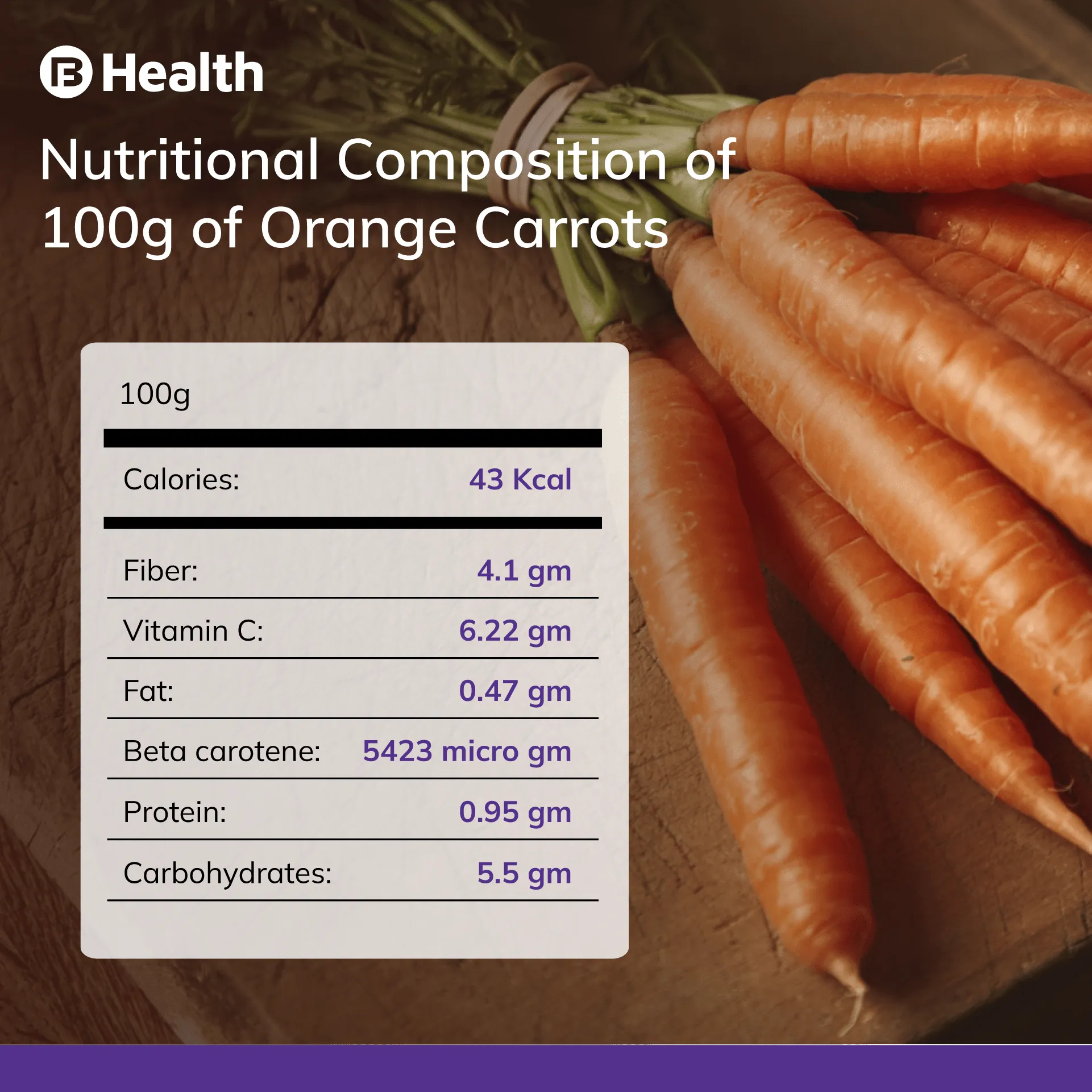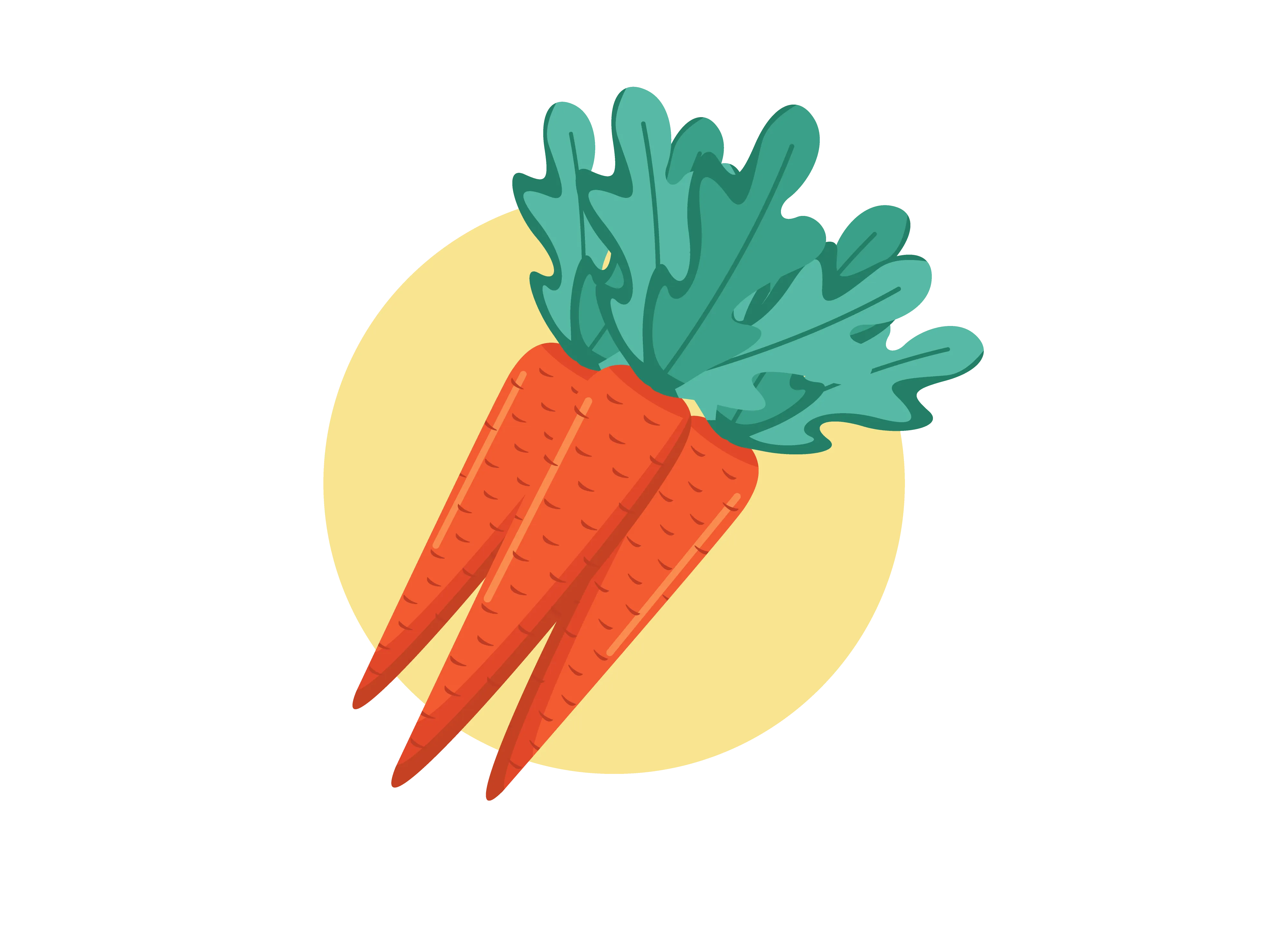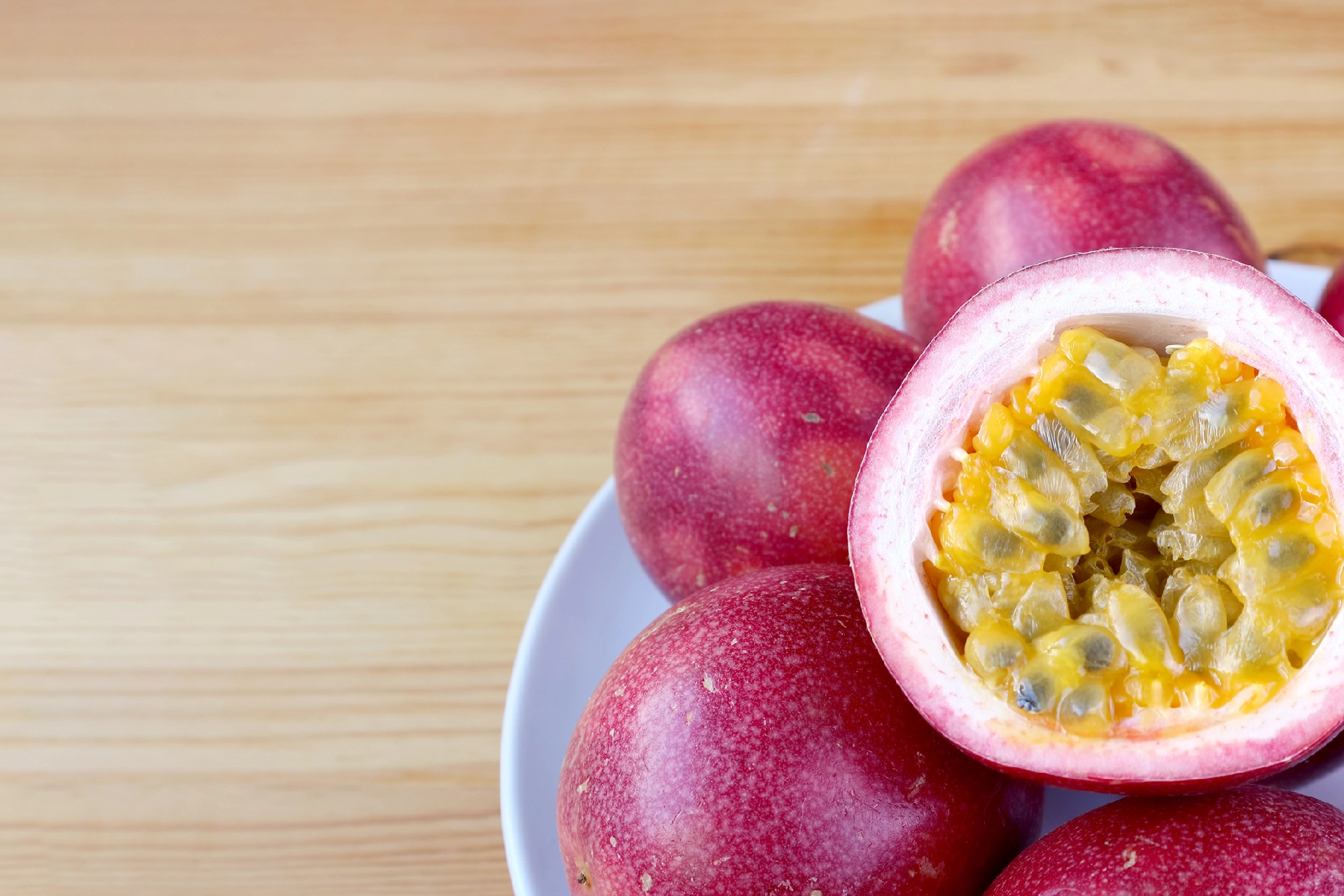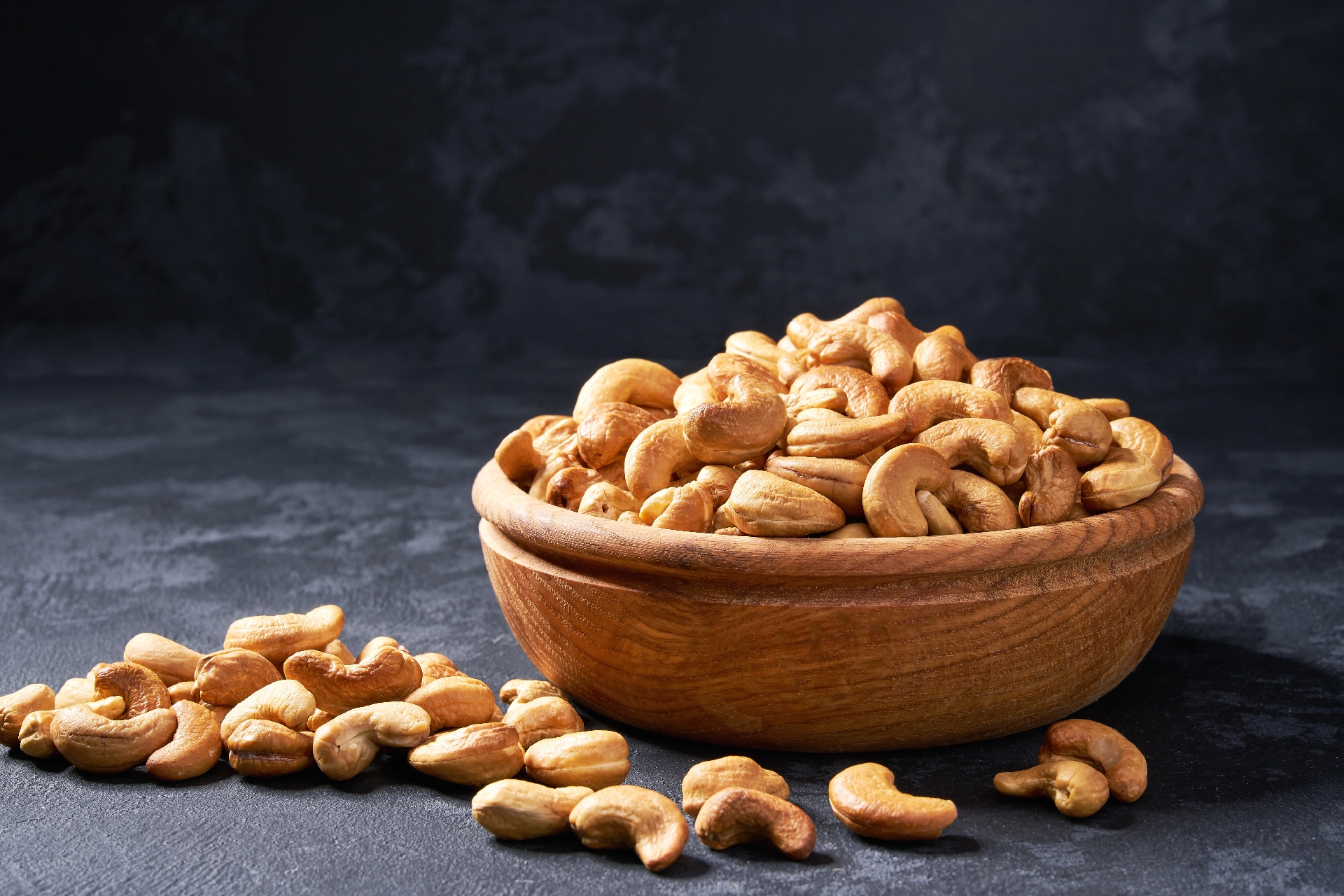General Physician | 13 min read
Carrots: Nutrition Value, Benefits, Healthy Recipes, Precaution
Medically reviewed by
Table of Content
Key Takeaways
- Boosting immunity is one of the health benefits of carrots
- Carrot juice benefits your health by minimizing cholesterol
- Gajar can be consumed in the form of soup or raw as sticks
The crunchy and juicy carrot is beneficial for your skin, hair and health. Loved by all and packed with nutrients, carrot benefits your health by
- reducing bad cholesterol
- improving eye health
- reducing your weight
Several nutrients present in this winter food include:
- Vitamin K
- Potassium
- Beta-carotene
- Fiber
Nutritional Value of Carrots
Carrots are nutritious and flavorful vegetables that can be enjoyed in various dishes. One medium-sized raw carrot contains approximately 29 calories, with a protein content of 0.6 grams, carbohydrates at 5.8 grams, dietary fibre at 1.7 grams, and fat at 0.1 grams. Carrots are also an excellent source of beta-carotene, a type of carotenoid, with 8285 micrograms per 100 grams.
An interesting fact about carrots' nutritional value is that they may increase when cooked. While many vegetables tend to lose some nutrient content when cooked, studies have shown that the body can absorb beta-carotene from cooked carrots compared to raw carrots. This means that cooked carrots may be a more nutritious choice in some cases. However, it is important to note that raw carrots also offer a range of nutrients and can be a healthy addition to the diet.
This orange vegetable is commonly known as gajar and available in other colors like red, purple, yellow and white. The orange color of carrots is due to the presence of beta-carotene. This is an antioxidant that gets converted to vitamin A when you eat it. It is the ideal vegetable for winters because of its umpteen benefits. Carrot comes with the goodness of lycopene, alpha-carotene, anthocyanins and polyacetylenes. To understand more about the health benefits of carrots, read on.
Benefits Of Eating Carrots
Reduces Cholesterol
Among various winter seasonal fruit and vegetables, carrot is an important one to eat. Research reveals that having carrot improves your antioxidant levels [1]. This destroys free radicals and prevents plaque buildup in your arteries. Carrots are rich in soluble fiber that helps your body excrete bile acids. This lowers your blood cholesterol.
Additional read: Foods To Reduce CholesterolImproves Vision
Carrots are rich in carotenoids that promote healthy vision. Beta carotene in carrots converts to vitamin A once you consume it. This vitamin is a vital nutrient that helps you reproduce, grow and boost your immune system. A deficiency of vitamin A can cause vision-related problems. Both beta and alpha carotenes act as powerful antioxidants in your body. These lower the risk of heart diseases and cancer too. Consuming this vegetable in the form of winter soups and winter desserts is great for health.
Reduces Weight
Being a low-calorie vegetable, carrots are the best options to try if you want to shed those extra kilos. Having them satiates you for a longer period without the need to worry about calorie increase [2]. Blend it into a soup or munch it in the form of carrot sticks to enjoy its amazing weight loss benefits.
Boosts Your Immune System
Carrot contains vitamin C and A, which play vital roles in improving your immunity. Another reason they help boost immunity is that carrots contain antioxidants. Regular intake of this vegetable helps in building a strong immune system. In fact, this is the best nutrient therapy for health!
Promotes Digestion
The soluble fiber present in this vegetable promotes healthy bowel movements. Having carrots strengthens your digestion and keeps your blood glucose levels in control. The presence of fiber in carrots makes it suitable even for diabetic patients. Another reason it is ideal for diabetics is that carrots have low glycemic index.

Lowers Blood Pressure
Carrots contain potassium that helps in relaxing your arteries and blood vessels. This helps in proper blood circulation that helps reduce blood pressure. As a result, your cardiovascular health improves. This further reduces the risk of heart ailments.
Additional read: Heart Healthy DietHelps Manage Menstrual Problems
Eating carrot during menstruation reduces heavy blood flow. This is due to the presence of beta carotene. Carrots also help produce red blood cells in the body. They also reduce postmenopausal symptoms like mood swings and hot flashes. Prepare a juice by mixing carrots with amla, beets and spinach to get amazing benefits!
Flushes Out Toxins from the Body
Since carrots are rich in vitamin A, eating them prevents fat and bile accumulation in the liver. This helps excrete unwanted substances from your body thereby keeping your organs healthy. The water-soluble fiber present in carrots helps in getting rid of toxins from your body.
May Lower Cancer Risk
Carrots are a rich source of phytochemicals, including beta-carotene and other carotenoids, which have been shown to have anticancer properties. These compounds may boost immunity and activate proteins that inhibit cancer cells, and some research suggests that carrot juice may be effective in combating leukaemia. Carotenoids found in carrots have also been linked to a reduced risk of several types of cancer in women, including stomach, colon, prostate, lung, and breast. At the same time, some people believe that carrots may also help to reduce the risk of oral cancer, although more research is needed to confirm this potential benefit. [1]
Could Improve Skin Health
Carrots are a good source of carotenoids, which are compounds that have been shown to promote healthy skin and may even help to reduce the appearance of ageing. However, it is important to note that consuming too many carrots or other foods high in carotenoids can lead to carotenemia, in which the skin appears yellow or orange. Therefore, while adding carrots to your diet can be a healthy choice, it is important to consume a varied diet and not rely on any one food as a primary source of nutrients.
Boosts Hair Growth
Carrots are an excellent source of vitamins A and C, carotenoids, potassium, and other antioxidants. While some people believe that carrots may be beneficial for hair health, there is currently limited scientific evidence to support this claim. In the meantime, carrots can still be enjoyed as a nutritious and flavorful addition to the diet.
Helps in treating diabetes
Adopting a healthy lifestyle, including following a balanced diet and maintaining a healthy weight, can reduce the risk of developing type 2 diabetes. Some research has found that people with diabetes tend to have lower levels of vitamin A in their blood and that vitamin A may help address abnormalities in glucose metabolism and combat oxidative stress. Carrots are a good source of fibre, and several studies have shown that increasing fibre intake can improve glucose metabolism in people with diabetes. Adding carrots to your diet can be a healthy choice for individuals with diabetes as part of an overall balanced and nutritious meal plan. [2]
Helps strengthen bones
Vitamin A plays a role in bone cell metabolism, and the carotenoids found in carrots have been linked to improved bone health. While there is currently no research specifically examining the effect of carrots on bone health, their vitamin A content may contribute to healthy bones. However, more studies are needed to fully understand this relationship and determine how much carrots can support healthy bones.
Beneficial for gums and teeth
Evidence suggests that chewing carrots may promote oral cleanliness and freshen your breath. While there is no scientific research specifically examining the effect of carrots on breath freshening, some people believe that the vegetables may be able to neutralize citric and malic acids that can be left behind in the mouth, contributing to good oral health. However, it is worth noting that while carrots can be a healthy choice as part of a balanced and nutritious diet, they should be consumed in moderation as part of an overall oral hygiene routine that includes brushing, flossing, and regular dental visits. [3]
Helps treat PCOS
Carrots are a type of non-starchy vegetable with a low glycemic index. It means they have a slower effect on blood sugar levels compared to some other foods. These properties may make carrots a good choice for people with polycystic ovary syndrome (PCOS). However, there is currently no research specifically examining the effect of carrots on the treatment of PCOS. While carrots can be a healthy and nutritious part of a balanced diet, it is important to note that they should not be relied upon as a sole treatment for any condition.
Supports healthy pregnancy
Adequate intake of certain nutrients, including vitamin A, is important for the health of both the mother and the developing baby during pregnancy. For example, carrots are a good source of vitamin A, which is important for fetal growth and development and the health of the mother's immune system and vision. Some research has also suggested that consuming carotenoids, including those found in carrots, may reduce the risk of preterm birth. However, it is essential for pregnant women to speak with their healthcare providers about their specific nutrient needs and to follow a balanced diet that includes a variety of fruits and vegetables. [4]
Reduces the risk of stroke
Stroke is a leading cause of disability and death worldwide. Some research has suggested that a diet high in fruits and vegetables, including carrots, may be associated with a reduced risk of stroke. One study found that people who consumed at least three servings of carrots per week had a 25% lower risk of stroke compared to those who consumed fewer carrots. [5]

Healthy Recipes To Consume Carrots
The earthy sweetness of carrots makes them an excellent flavour to highlight. They can be incorporated into your daily diet in a variety of ways. Here are a few mouthwatering recipes for carrots that will give your bag of underutilised carrots the respect it deserves. They all utilise the vegetable's distinctive sweet and earthy flavour in sweet, salty, and spicy ways that you've probably never seen or tasted before.
Carrot Lettuce Wrap
Looking for a unique and tasty way to incorporate carrots into your meals? Try this delicious carrot lettuce wrap recipe! It's quick and easy to make and only requires a few simple ingredients. Plus, it's a great way to use up any leftover carrots that might be sitting in your fridge.
To make this dish:
- Start by heating oil in a pan and add grated ginger, chopped garlic, sliced onions, and green chillies.
- Stir fry these ingredients for about a minute, then add julienned carrots and sweet corn.
- Finish the filling by adding lime juice, soy sauce, and chilli sauce and sautéing for an additional minute.
- Once the filling is cooked, remove it from the heat and add salt to taste.
To assemble the wraps, wash and separate the lettuce leaves, then spoon in 1-2 tablespoons of the filling into each leaf. Roll the lettuce leaves to enclose the filling, and serve. This recipe serves two people and can be easily adjusted to serve more or less, depending on your needs. Enjoy!
Carrot Sprouts Paratha
Servings: 4
Time required to prepare: 10
Ingredients:
- Carrot: 1 medium chopped
- Potato: 1 small
- Green gram sprouts: 2 tablespoons
- Whole wheat or multigrain flour: 3 cups
- Ginger, chopped: ¼ teaspoon
- Dry mango powder and black pepper powder: ¼ teaspoon each
- Oil for shallow frying
- Coriander leaves, chopped: 1 tablespoon
- Red chilli powder: ¼ teaspoon
- Salt: to taste
Instructions:
- Begin by pressure cooking the carrots and potatoes. This will help them become soft and easy to mash.
- Lightly steam the green gram sprouts. This will help preserve their nutrients and crunchy texture.
- In a blender, grind the cooked carrots to make a puree. Mash the cooked potatoes with a fork or potato masher.
- In a large mixing bowl, combine the carrot puree, mashed potatoes, sprouts, whole wheat or multigrain flour, ginger, dry mango powder, black pepper powder, coriander leaves, red chilli powder, and salt. Mix everything to form a smooth dough.
- Cover the dough and set it aside for 30 minutes to allow the flavours to meld and the dough to rest.
- Pinch off small balls of dough about the size of a golf ball. Sprinkle some flour onto a clean surface and roll out each ball into a thin circle about the same size as a roti.
- Heat a pan over medium heat. Place the rolled-out paratha into the pan and cook for a few minutes until the bottom is partially cooked. Flip the paratha and brush a small amount of oil onto the top. Continue cooking until brown spots appear on both sides.
- Serve the carrot and sprouts paratha hot, on its own or with a side of your choice. Enjoy!
Carrot Sunshine Drink
This refreshing and tasty drink is a great way to start your day. It's packed with vitamin C from the oranges and carrots, and the natural sweetness of the carrots balances out the tartness of the tomatoes and lemon juice. This recipe makes enough for four servings, so it's perfect for sharing with friends or family.
Ingredients:
- 3/4 cup carrots, peeled and chopped
- 1.5 cups tomatoes, chopped
- Two medium oranges, separated into segments
- A few drops of lemon juice
- Salt and pepper, to taste
- 1 cup crushed ice (optional)
- One teaspoon of organic honey (optional)
Instructions:
- Combine all ingredients in a juicer, adding 1/2 cup of water to help blend everything together.
- Pour the juice into four glasses and add crushed ice, if desired.
- Enjoy immediately, or store in the refrigerator for later use. You can also add a touch of honey for extra sweetness if desired.
Risks And Considerations For Carrots
Some individuals with compromised immune systems, such as those undergoing cancer treatment, pregnant women, young children, and older adults, may need to be particularly cautious when it comes to consuming certain foods. This is because these foods could contain harmful bacteria or other pathogens that could lead to foodborne illnesses, which can be particularly dangerous for individuals with weakened immune systems. To minimize the risk of illness, these individuals may need to avoid certain foods or take extra precautions when preparing and handling them.
Freshly squeezed fruit and vegetable juices might not be the pasteurization process, which involves heating the juice to a high temperature in order to kill any potentially harmful bacteria or other pathogens. As a result, these juices have a higher risk of carrying infectious agents such as bacteria, viruses, or parasites, which could lead to foodborne illnesses. This risk may be particularly concerning for individuals with compromised immune systems, as their bodies may be less able to effectively fight off these infectious agents, potentially leading to a more severe reaction.
Precaution For Carrots
The Memorial Sloan Kettering Cancer Center advises that individuals following a low microbial diet, as recommended by a healthcare professional, should avoid consuming unpasteurized fruit and vegetable juices unless they are homemade. This is because homemade juices have a lower risk of carrying harmful bacteria or other pathogens, as they have been prepared in a clean and controlled environment. However, it is important to note that homemade juices should be handled and consumed with caution, as there is still a risk of contamination.
The Food and Drug Administration (FDA) recommends that pregnant women choose pasteurized juices or those with a long shelf life to reduce the risk of foodborne illness during pregnancy. However, it is generally best to avoid consuming freshly squeezed juices during pregnancy, as they may not have undergone the pasteurization process and may carry a higher risk of carrying harmful bacteria or other pathogens.
Conclusion
Carrots are a good source of a type of carotenoid called beta-carotene, which the body can convert into vitamin A. While consuming large amounts of carotenoids from foods is generally considered safe and is not linked to harmful effects, it is possible for a person's skin to turn yellow or orange if they consume large amounts of beta-carotene over a long period of time. This condition is called carotenoderma. However, this effect is typically temporary and disappears once carotenoid intake is reduced. In addition, the consumption of beta-carotene supplements has been linked to an increased risk of lung cancer in smokers or former smokers, so it is generally best to obtain this nutrient from food sources rather than supplements.
Have carrots in both in raw and cooked forms. You can grate it and have it in the form of salads. Another interesting way to eat carrots is in the form of carrot juice. Carrot juice benefits your health in many ways, and you can prepare it with ease. Munching carrot sticks is a great way to curb your hunger pangs too. For diet-related concerns, you can connect to reputed nutritionists on Bajaj Finserv Health. Book an online doctor consultation and keep yourself safe from health ailments.
References
- https://pubmed.ncbi.nlm.nih.gov/14569406/
- https://pubmed.ncbi.nlm.nih.gov/16925866/
Disclaimer
Please note that this article is solely meant for informational purposes and Bajaj Finserv Health Limited (“BFHL”) does not shoulder any responsibility of the views/advice/information expressed/given by the writer/reviewer/originator. This article should not be considered as a substitute for any medical advice, diagnosis or treatment. Always consult with your trusted physician/qualified healthcare professional to evaluate your medical condition. The above article has been reviewed by a qualified doctor and BFHL is not responsible for any damages for any information or services provided by any third party.



